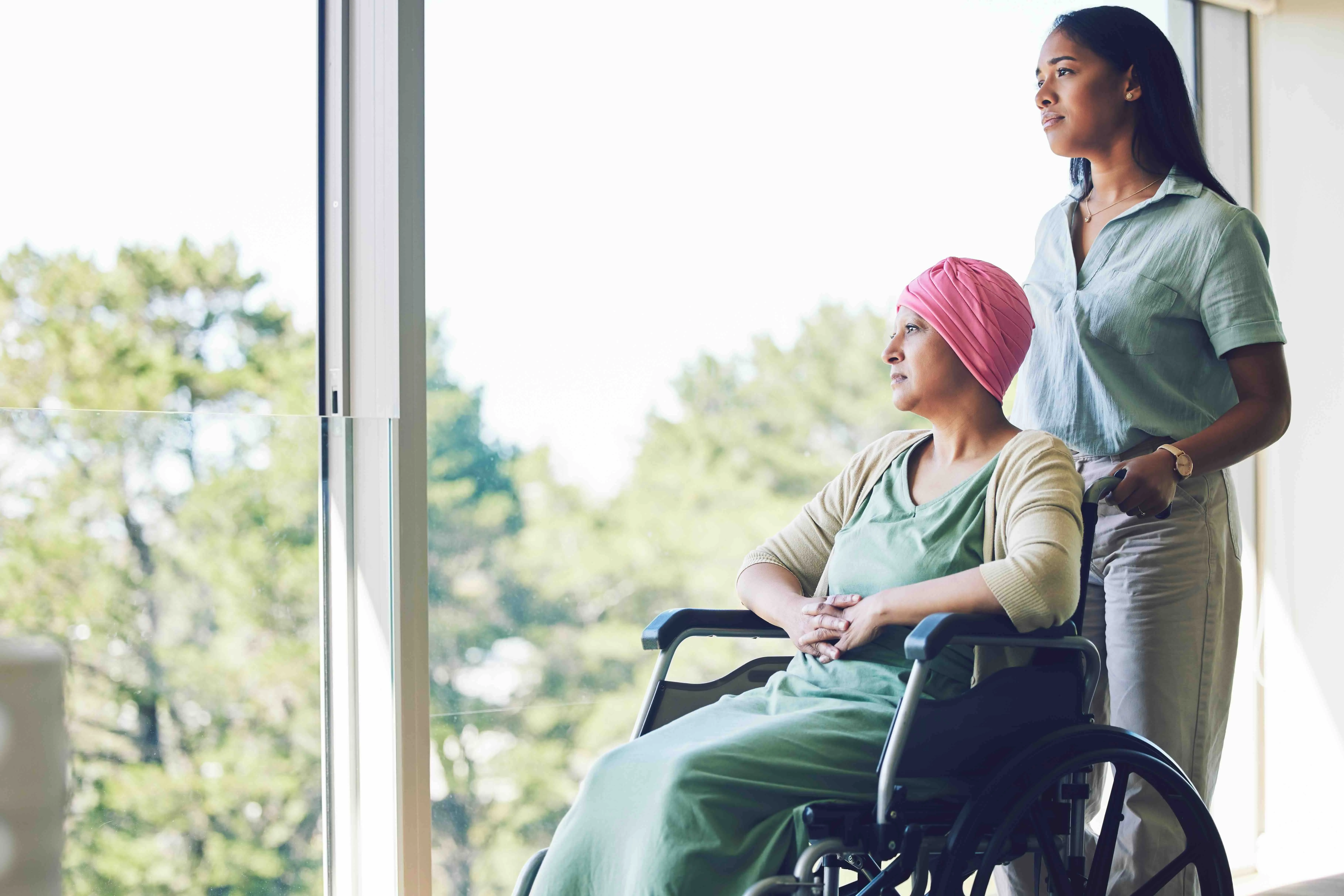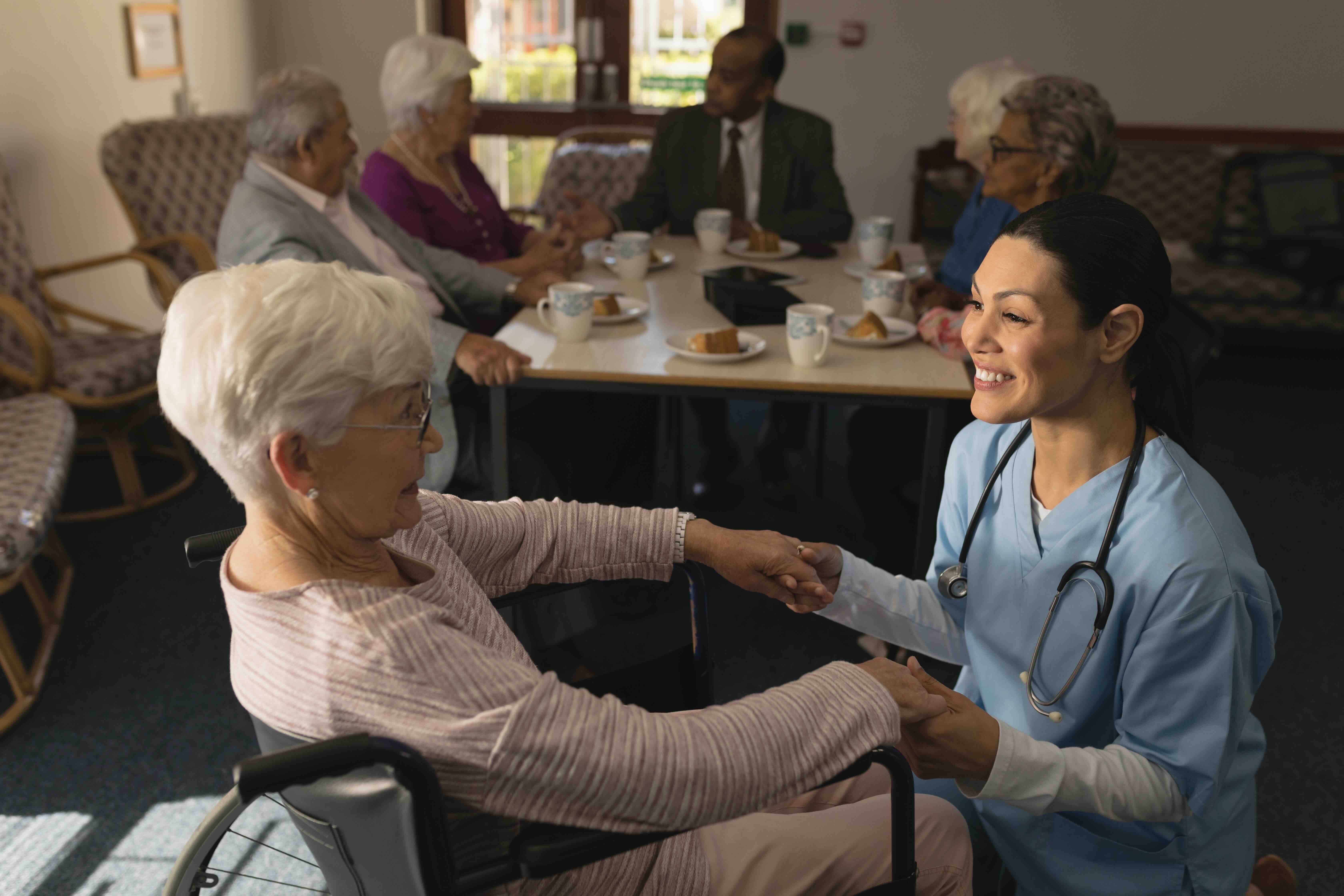Cancer Caregiving Support for a Family Member

Cancer is an unfortunate fact of life, and nearly anyone you meet has their own story of coping with, treating, or caring for a loved one who was diagnosed. According to the CDC, there were 1,851,238 new cancer cases reported in America in 2022. While that means that a cancer diagnosis isn't rare, receiving one can still be scary, debilitating, and anxiety-inducing.
Undergoing cancer treatment itself can be difficult both mentally and physically, and it can take a toll on cancer patients as well as their caregivers. Caring for a loved one with cancer is an act of profound compassion, and often comes with immense complexity. Whether you're assisting with daily routines, helping manage appointments, or offering emotional support, caregivers are critical to the well-being of cancer patients. But this journey can be overwhelming. Understanding the challenges and accessing the right resources can help lighten the load.
This guide offers practical insights into cancer caregiving support, crafting a personalized cancer care plan, and providing effective home care for cancer patients, all while taking care of your own mental health and physical well-being in the process.
Understanding the Role of a Cancer Caregiver
A cancer caregiver may be a spouse, parent, child, sibling, or friend. They often find themselves juggling numerous responsibilities, including:
- Scheduling and attending medical appointments
- Assisting with medication and treatment regimens
- Preparing meals and managing special diets
- Handling insurance, paperwork, and transportation
- Providing emotional and social support
It’s a demanding role that requires patience, adaptability, and knowledge. But you don't have to do it alone! Resources like a cancer helpline or support group can provide expert guidance and comfort.
Building a Personalized Cancer Care Plan
Creating a cancer care plan is crucial to staying organized and reducing stress. Having a well-structured plan is more than just having an understanding of where treatment is today and where it's headed; a great plan also keeps the patient's friends and family all on the same page. When communication and updates are streamlined, no one has to guess if they're seeing the full picture.
A great cancer care plan should include:
Medical Information Tracking
It's alarmingly easy to lose track of basic facts of cancer care, like the specific diagnosis and stage of cancer. Organizing all of the treatment protocols (chemotherapy, radiation, surgery, etc) can help keep the care plan clear, while streamlining what options are as treatment progresses.
Some care coordination apps like Caily are even built to integrate with your Electronic Health Record (EHR) system, so that notes are carried over directly as they were entered by the medical professionals. This can help give an even more-rounded picture of the care being delivered and the progress of recovery, with doctors' notes supplemented by your own tracking.
Another essential is to track all of the cancer medications that are prescribed. By noting schedules and side effects, you can make sure everything is being taken according to the plan and improves medication adherence.
Appointment Management
Cancer treatment requires a dizzying number of appointments and tests. With a shared digital calendar, all the doctor visits, lab tests, and treatment sessions can be input and accessible to the whole care circle.
Communication Strategies
In addition to medical notes, it helps to consistently track vitals. One of the core features of Caily is our Daily Check-Ins, which are a simple way to provide a daily snapshot of how a patient is progressing. By offering an easy place to report pain, symptoms, and overall mood, the Daily Check-Ins can flag a problem before it becomes debilitating.
Legal and Administrative Tasks
Along with all the treatments and appointments, cancer treatment involves a veritable truckload of paperwork. Even if end-of-life planning isn't a bridge that you or your loved one want to cross yet, it's a great idea to plan for the future by defining advance directives, medical powers of attorney, and wills.
Tools like Caily can simplify these tasks by acting as a central hub for medical documentation and family communication, helping you keep your cancer caregiving support system connected and informed.
Home Care for Cancer Patients: What to Expect
Providing home care for cancer patients can make them more comfortable and reduce the emotional burden of frequent hospital visits. However, it also demands heightened awareness and preparation.
Here are a few key home care areas to pay attention to:
- Pain and Symptom Management: Keep a log of symptoms and report changes to the oncology team. Learn how to administer medications if needed.
- Nutrition and Hygiene: A cancer patient’s nutritional needs may change. You may need to help with meal prep, feeding, or maintaining hygiene if they become weak.
- Mobility and Safety: Prepare the home to accommodate mobility aids like wheelchairs or walkers, and minimize fall risks.
- Infection Prevention: Chemotherapy and radiation can weaken the immune system. Prioritize cleanliness and limit exposure to germs.
Don’t hesitate to seek help from visiting nurses, home health aides, or palliative care specialists when appropriate.
Emotional Well-being: Caring for the Caregiver
Caregivers often put their needs last, but your emotional and mental health matters. Chronic stress can lead to burnout, depression, or physical illness. Here’s how to stay resilient:
- Join a Support Group: Sharing your story with others who understand can be healing. Look on Facebook, Reddit, or your local community for relevant groups to join.
- Use a Cancer Helpline: National Cancer Institute (1-800-4-CANCER), American Cancer Society, and other organizations offer 24/7 assistance.
- Take Breaks: Respite care, whether a few hours or a weekend off, gives you time to recharge.
- Practice Self-care: Exercise, eat well, sleep enough, and find moments of joy amid the challenges.
Navigating Treatment: Advocacy and Communication
You are not just a caregiver, you’re an advocate. Understanding treatment options and being an active participant in discussions with healthcare providers can improve outcomes.
Key Tips:
- Prepare a list of questions before appointments.
- Don’t be afraid to request second opinions.
- Stay informed about side effects and when to seek emergency care.
- Keep a folder (digital or physical) of all cancer treatment patient records and lab results.
Tapping into Resources and Support Networks
You don’t have to do this alone. Organizations that provide cancer caregiving support include:
- American Cancer Society: Offers transportation, lodging, a 24/7 helpline, and local support groups.
- CancerCare: Provides counseling, financial assistance, and educational workshops.
- Caregiver Action Network: Tips and peer connections for caregivers of all kinds.
- Local Cancer Centers and Hospitals: Often offer caregiver-specific programs and navigators.
Also explore digital platforms that centralize communication, document storage, and task management—tools that can significantly reduce caregiver stress and ensure continuity of care.
Caring for someone with cancer is a journey of love, resilience, and constant adaptation. While the challenges are real, so are the rewards of making a meaningful difference in your loved one’s life. By staying organized, seeking support, and prioritizing your own health, you can provide the compassionate care your family member needs while protecting your own well-being.
FAQs About Cancer Caregiving
What support is available for caregivers of cancer patients?
Caregivers can access support through organizations like the American Cancer Society, CancerCare, and local hospitals. These resources provide emotional support, educational materials, financial aid, and helplines like the cancer helpline (1-800-227-2345). Many also offer respite care and caregiver training.
How do you create a cancer care plan for a loved one?
A cancer care plan should include the patient’s diagnosis, treatment schedule, medication list, side effects, emergency contacts, and a record of questions for the medical team. Organize this information digitally in an app like Caily to make it accessible to all family members involved in caregiving.
What is home care for cancer patients and how does it work?
Home care for cancer patients involves providing medical and emotional support in the patient’s residence as opposed to a hospital or other medical facility. Home care services may include pain management, nutrition guidance, hygiene assistance, and coordination with visiting nurses. This setup helps improve comfort and quality of life during treatment.
How can caregivers support cancer treatment patients emotionally?
Supporting cancer treatment patients emotionally means being present, listening actively, validating their feelings, and encouraging open communication. Encouraging light activities, celebrating small victories, and connecting them with mental health support can also make a big difference.
What should caregivers do when feeling overwhelmed?
Caregiver burnout is common. If you’re feeling overwhelmed, reach out to a cancer caregiving support network, talk to a counselor, or contact a cancer helpline. Taking short breaks, practicing self-care, and asking for help from friends or professionals are essential steps.
Are there financial assistance programs for cancer caregivers?
Yes! Many organizations offer financial help for both patients and caregivers. This includes travel assistance, lodging, and co-pay relief. Check with local nonprofits, hospital social workers, and national groups like CancerCare or the Patient Advocate Foundation.
Can I work and still provide care for a cancer patient?
Balancing work and caregiving is challenging but possible. Use employer-supported leave options (like FMLA), flexible schedules, or remote work. Time-saving tools, coordinated cancer care plans, and shared caregiving responsibilities can help you manage both roles effectively.

Get Started Now
Enjoy full access to everything Caily offers, from medication tracking to shared schedules and daily check-ins. See how much easier caregiving can be when everything is coordinated in one place.
Start your free trial



